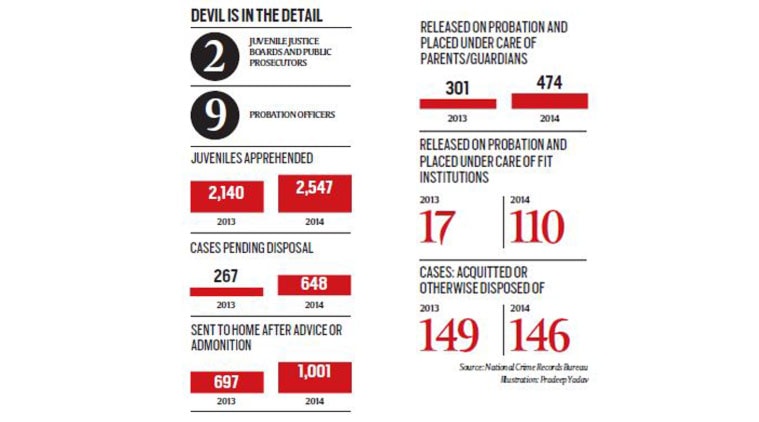The 12-year-old boy stands near a pole. He chooses to be silent, as his father tries to talk to him. He shows signs of restlessness, tries to look inside the courtroom, waiting for his name to be called. When his name is called out, a man escorts him inside. Within minutes, the man comes out of the courtroom, this time to escort two more boys. The man, an officer of special juvenile unit, has a busy day at the Juvenile Justice Board.

In another room, five special juvenile unit officers are in a queue, waiting for their turn to go inside. In this room, the public prosecutor is busy scrutinising the five charge sheets. He is offered a cup of coffee; he takes two sips, returns to work. In less than two hours, without a break, the 35-year-old prosecutor completes the task of scrutinising the five charge sheets from five different police stations. Case files for the next day are placed before him. The officers move out. His work continues.

Delhi saw a staggering 143 per cent increase in pendency of cases before its two juvenile justice boards in 2014 compared to the previous year. With more than 2,000 juveniles held in 2014, and at least 600 cases to be disposed of, the two juvenile justice boards and the two public prosecutors have their task cut out. Lack of infrastructure at the juvenile justice boards is adding to delay in delivery of justice, say insiders. They point to an array of numbers and say odds could not be more stacked against them.
Also Read: Hardlook at juvenile justice system: Why change international discourse on the age of a juvenile, says Arun Mathur
For instance, a prosecutor works for more than eight hours a day, and looks after more than 1,000 cases registered annually by police stations. In a day, an average of 10 charge sheets are placed before a prosecutor for scrutiny before they are filed before the court, say sources. An average of 30 cases each are heard every day at the two juvenile justice boards, add the sources. These include recording of prosecution evidence by a single prosecutor and other pleas moved by the state and the defence.
“Then, there is lack of infrastructure. The prosecutor has not been given a computer for official work, receives no funds for basic stationery, and not a single staff has been provided by the department of Women and Child Development to assist him,” says a source. “Worse still, the prosecutor has to use the Juvenile Justice Board’s resources to get pleas and other applications typed and printed.”
Story continues below this ad
The source tells The Indian Express, “The problem is the Delhi government has not recognised the importance of a prosecutor. If you want to reduce crime, you have to offer people an effective criminal justice delivery system. A prosecutor is central to an effective delivery system. Here a prosecutor is given a chair, a table and asked to work. In this era of technology, the prosecutor has to go to court to get even a single sheet typed. Forget providing a computer, basic stationery such as a pen is also not given. How do you expect one to expedite cases?”
Also Read: Hardlook at juvenile justice system: Motive or intent of adolescents not same as that of adults, reveals study
According to another source, a letter was sent to the director of the Women and Child Development department earlier this year, pointing out lack of infrastructure in the office of the prosecutor. The department is yet to respond, says the source.
The two juvenile justice boards also face shortage of probation officers, say sources. The probation officers are responsible for producing social investigation reports that contain details of rehabilitation and mentoring of juveniles by them, as mandated by the Juvenile Justice Act. A social investigation report has to be produced before the board before every hearing. Proceedings in a case cannot go forward in the absence of a social investigation report.
Story continues below this ad
At present, there are nine probation officers. They have been appointed on contract basis. Sources say, at least, one out every third case gets delayed due non-filing of social investigation reports.
“At least, 600 juveniles were sent on probation in 2014. While shortage is an issue, sometimes the probation officers are also not paid on time,” says an insider.
The fault lines, however, extend beyond the Juvenile Justice Boards to the Child Welfare Committees (CWCs), the sole authority to deal with matters concerning children in need of care and protection, say sources. A few CWCs do not even have a photocopy machine and welfare officers handle administrative work as well as counselling amid staff shortage, add the sources.
Many juveniles accused of breaking the law are migrants and the CWCs have been criticised for their “tendency to put the children in institutions for long and not wanting to transfer the children to their states”.
Story continues below this ad
At a workshop in Delhi secretariat this year, a view surfaced that CWCs in Delhi “have the opinion” that CWCs in other states are not performing their mandate “as per the Act”, therefore the children, “until their parents are traced, are generally not sent to their respective state children homes”. According to sources, such acts are “a violation of the Juvenile Justice Act”. It was decided at the workshop that “focus should be on restoring” children to their states, rather than keeping them in Delhi “for long duration”.

 The capital’s justice delivery system dealing with juveniles accused of breaking the law gets overwhelmed with the deluge of fresh cases.
The capital’s justice delivery system dealing with juveniles accused of breaking the law gets overwhelmed with the deluge of fresh cases.







